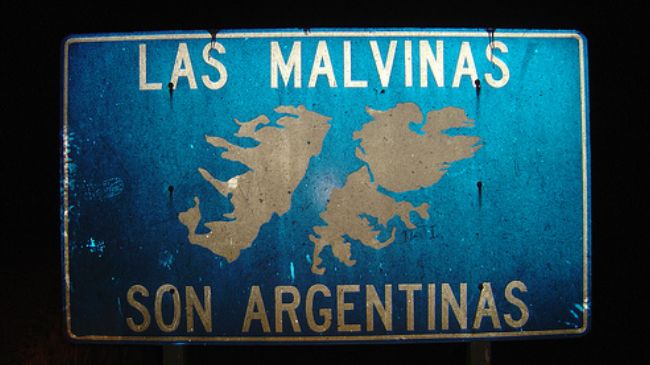Britain has no legal right to the Malvinas islands

Britain’s deployment of nuclear weapons in response to Argentina’s peaceful efforts to resolve the Malvinas issue is a grave violation of Chapter 1 Article 2(4) of the UN Charter (which prohibits the threat of force), a new report says.
According to the report, the Malvinas were terra nullius [no man’s land] when the French colonized the islands in the 18th century. They were then sold to Spain, a transfer of sovereignty which Britain recognized.
However, upon decolonization and under the principle of uti possidetis [as you possess], sovereignty should have been transferred to Argentina, which declared independence in 1816.
In 1833, Britain expelled the islands’ inhabitants. Argentina’s Foreign Minister Don Manuel Moreno was told by Prime Minister Palmerston that Argentina “could not reasonably have anticipated that the British government would permit any other state to exercise a right as derived from Spain which Great Britain had denied to Spain itself.”
Writing in the Yale Law Journal, W Michael Reisman affirmed that “Upon acquiring independence, a former colony”, i.e. Argentina, “ordinarily inherits all the territory of that colony.
This principle, enshrined in Latin America and, a century later, in Africa, would certainly appear to apply to the Falklands [Malvinas].” For Britons, the legal status of the islands is an open-and-shut case: Britain has no legal right to the islands. This has been reiterated at the General Assembly.
General Assembly Resolution 2065 (XX), adopted on 16 December 1965, “Consider[ed] … the cherished aim of bringing to an end everywhere colonialism in all its forms, one of which covers the Falkland Islands (Malvinas).” The Resolution left it to Argentina and Britain to negotiate the issue using bilateral diplomacy. Britain violated this aspect of the Resolution. As a result, in December 1973, General Assembly Resolution 3160 (XXVIII) “Express[ed] its gratitude for the continuous efforts made by the Government of Argentina … to facilitate the process of decolonization and to promote the well-being of the population of the island.” The Resolution also “Urge[d] the Governments of Argentina [and the UK] …to put an end to the colonial situation.”
Successive British governments have not only consistently violated the Resolution, but the Chatham House journal International Affairs – like the General Assembly – acknowledged Argentina’s peaceful efforts to resolve the issue (except, of course, the 1982 War, for which the previous government has apologized).
Guillermo A Makin’s paper in the journal recognized that “the use of force has not been a permanent feature of the approach of the various very different Argentine political regimes to the [Malvinas] dispute.”
A few years ago, the “British firm Rockhopper Exploration discovered a massive natural gas deposit – one that could be as big as 7.9 trillion cubic feet,” Money Week reported.
“By 2029 there is expected to be a considerable increase in demand for energy. In particular gas will be of increasing importance as states struggle to maintain energy supplies,” the Ministry of Defence explained.
“Many boundary disputes, such as those in the Arctic, Gulf of Guinea and the South Atlantic will become inextricably linked to the securing of energy supplies.”
Does anyone seriously think that were it not for the oil and gas, 1,400 soldiers (around one per islander) would be deployed at a cost of £40 million a year to defend a bunch of rocks that few Britons could find on a map?







